By Urbanist in Architecture & Design, Environment & Nature, Travel & Places, Urbanism 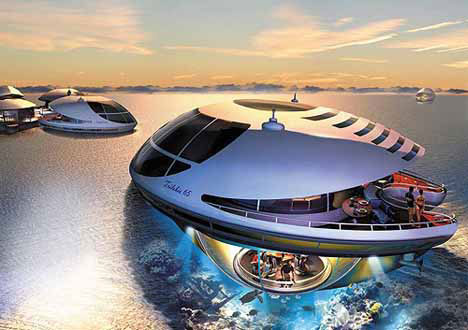
completely out of reach while others you may be able to afford but wouldn’t want for the world. This collection spans the extremes of design and brute-force ingenuity: from the obscenely luxurious to the absurdly simple.
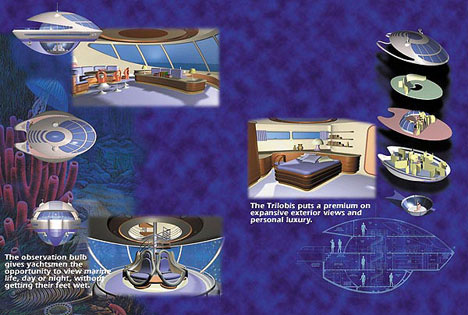
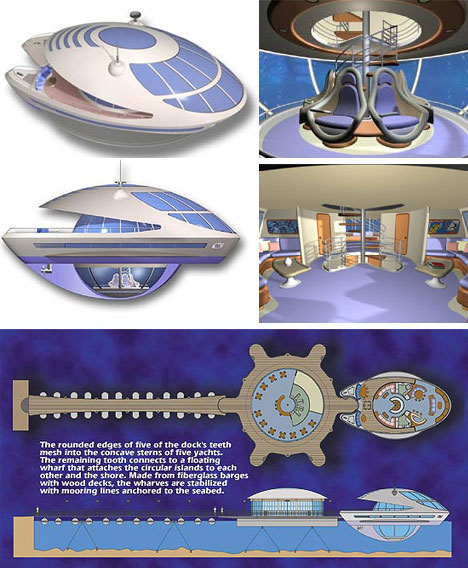
The Trilobis 65 is a semi-submerged masterpiece of cutting-edge design and ecological engineering. These modular living spaces are designed to be plugged into a network of docks, free to roam or to aggregate as desired. Residents enter into a common space on a main floor before moving into a lower observation deck with 365-degree views of the surrounding underwater environment or private cabin spaces above.
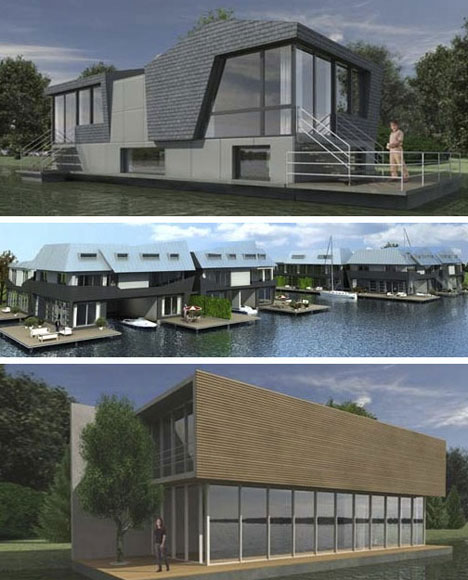
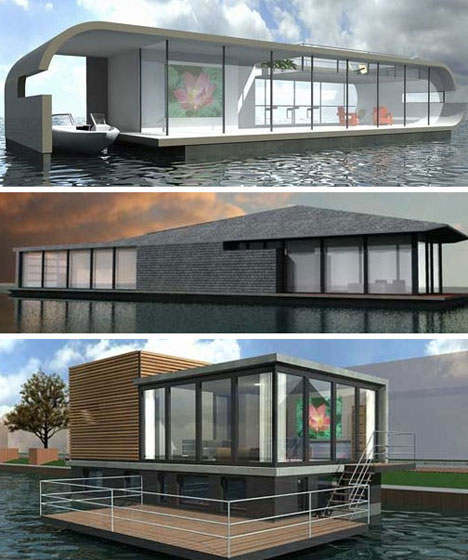
For some a floating home is a luxury or a hobby, but for others it may soon be (or already is) an absolute necessity. Take residents of Amsterdam for example: 20% of the country is already underwater and concerns about life on land have prompted some creative designs for future living. Necessity is the mother of invention and this case is no exception with Dutch designers stepping up to the challenge of creating modern floating homes suitable to more permanent living.
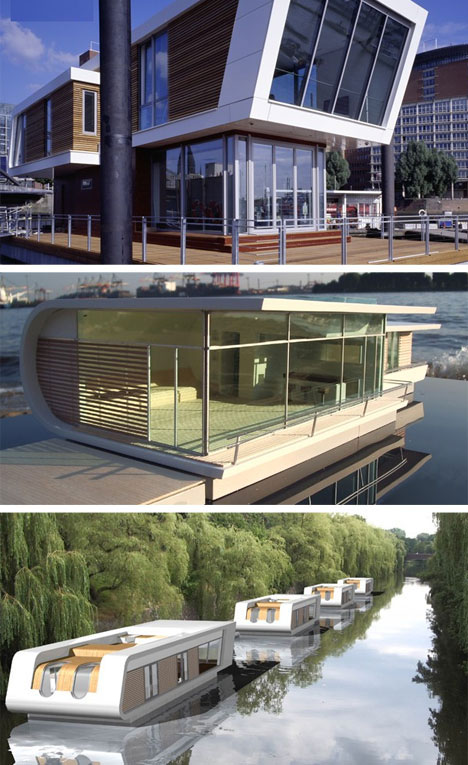
The German firm of Floating Homes GMBH has developed a number of sleek models, designs and real-life prototypes that take cutting edge German architectural design out onto the water. Some of their designs look like normal residences floating on flat modernist planes in oceanic space while others seem adapted to their dual purpose of resting and as well as gliding along the surface of the water.
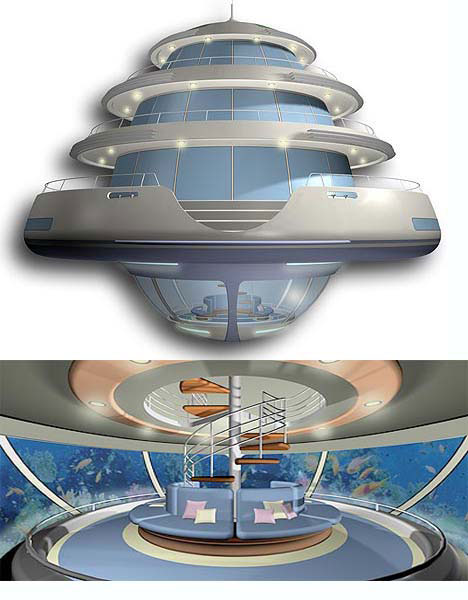
The Jelly-Fish 45 is arguably the most ambitious approach to marine living yet devised. At 33 feet high and 45 feet wide, this structure blows most houseboats out of the water. Like the Trilobis the Jelly-Fish submerged lower deck for dining, drinking and viewing ocean life. Of course, at $2.5 million per unit one would expect only the best. A spiral staircase joins the five stories of the floating habitat and ample windows accommodate views in all directions from all levels.
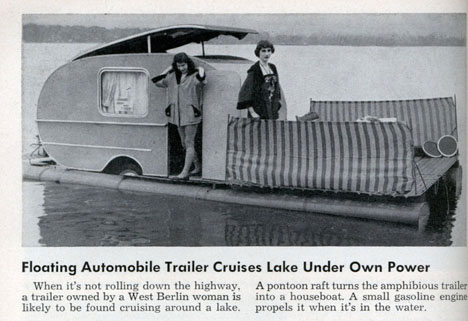
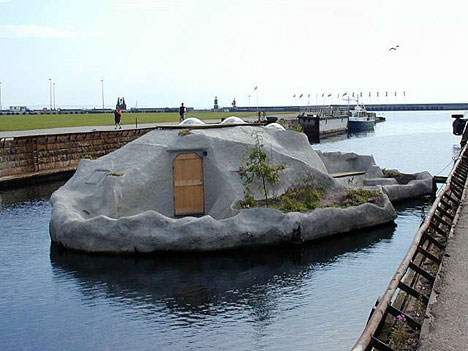
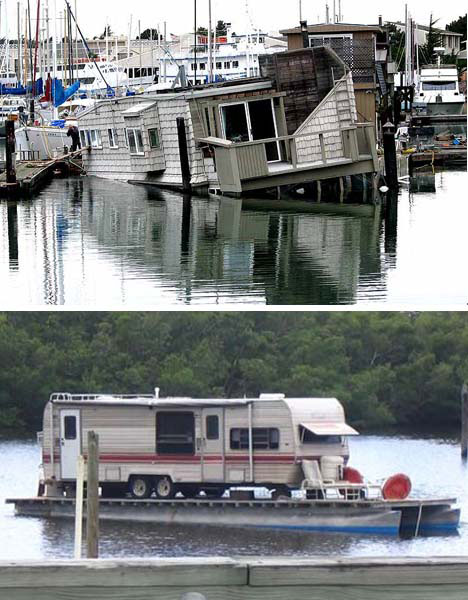
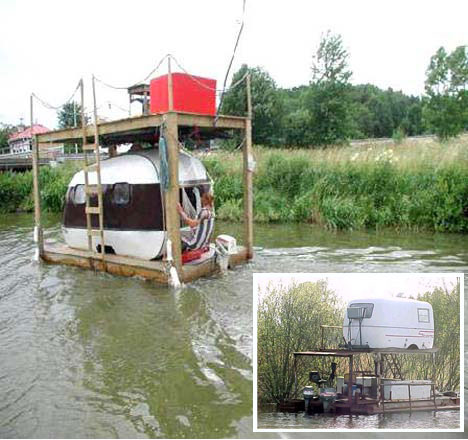
At the entire opposite end of the spectrum, these represent the ultimate in budget floating accommodations. What does one really need to live on the water after all? Just a platform and a shelter, right? Well, one simple way is to combine the two necessary elements using the cheapest and easiest objects available: a simple floating surface and a ready-made trailer or mobile home. Prefer something upscale but can’t afford to buy it? Try one of these amazing underwater and ocean-going hotels instead!

(Check out our complete collection of Underwater and Oceanic Oddities.)
Ever dream of sailing off into the sunset in your very own houseboat? Some of these are dreamy butcompletely out of reach while others you may be able to afford but wouldn’t want for the world. This collection spans the extremes of design and brute-force ingenuity: from the obscenely luxurious to the absurdly simple.


The Trilobis 65 is a semi-submerged masterpiece of cutting-edge design and ecological engineering. These modular living spaces are designed to be plugged into a network of docks, free to roam or to aggregate as desired. Residents enter into a common space on a main floor before moving into a lower observation deck with 365-degree views of the surrounding underwater environment or private cabin spaces above.


For some a floating home is a luxury or a hobby, but for others it may soon be (or already is) an absolute necessity. Take residents of Amsterdam for example: 20% of the country is already underwater and concerns about life on land have prompted some creative designs for future living. Necessity is the mother of invention and this case is no exception with Dutch designers stepping up to the challenge of creating modern floating homes suitable to more permanent living.

The German firm of Floating Homes GMBH has developed a number of sleek models, designs and real-life prototypes that take cutting edge German architectural design out onto the water. Some of their designs look like normal residences floating on flat modernist planes in oceanic space while others seem adapted to their dual purpose of resting and as well as gliding along the surface of the water.

The Jelly-Fish 45 is arguably the most ambitious approach to marine living yet devised. At 33 feet high and 45 feet wide, this structure blows most houseboats out of the water. Like the Trilobis the Jelly-Fish submerged lower deck for dining, drinking and viewing ocean life. Of course, at $2.5 million per unit one would expect only the best. A spiral staircase joins the five stories of the floating habitat and ample windows accommodate views in all directions from all levels.




At the entire opposite end of the spectrum, these represent the ultimate in budget floating accommodations. What does one really need to live on the water after all? Just a platform and a shelter, right? Well, one simple way is to combine the two necessary elements using the cheapest and easiest objects available: a simple floating surface and a ready-made trailer or mobile home. Prefer something upscale but can’t afford to buy it? Try one of these amazing underwater and ocean-going hotels instead!
Post Title
→17 Extreme Houseboats and House Boat Designs: From Luxury Habitats to Humble Floating Homes
Post URL
→http://arebelfansblog.blogspot.com/2011/06/17-extreme-houseboats-and-house-boat.html
Visit arebelfansblog for Daily Updated Wedding Dresses Collection


No comments:
Post a Comment